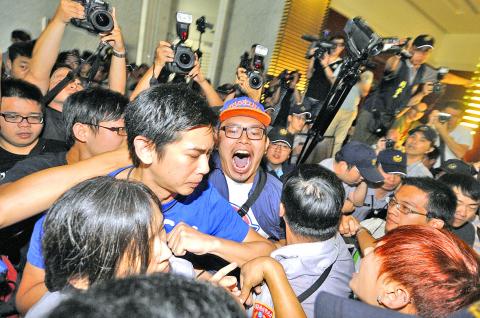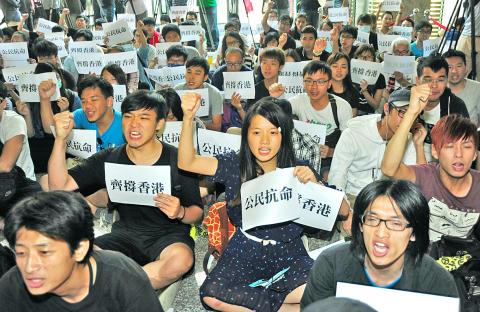In a display of solidarity with ongoing pro-democracy protests in Hong Kong, demonstrators stormed the lobby of the Hong Kong representative office in Taipei late on Sunday night, occupying it until yesterday morning.
About 100 demonstrators, mostly students, dispersed at about 10am after a tense exchange with office director John Leung (梁志仁) and minor clashes with police.
Headed by Sunflower movement leaders Chen Wei-ting (陳為廷) and Lin Fei-fan (林飛帆), the group protested against police brutality in Hong Kong and demanded that President Ma Ying-jeou (馬英九) halt all political and economic cross-strait negotiations.

Photo: Chen Chih-chu, Taipei Times
Upon arriving at the building at about 11pm on Sunday, the students staged a sit-in in the lobby, while large banners with pro-democracy slogans were drawn on the ground outside. Throughout the night, demonstrators sang songs and chanted slogans in Mandarin, Taiwanese and Cantonese, with many taught on the spot by students from Hong Kong.
Academia Sinica researcher Huang Kuo-chang (黃國昌) arrived in a small truck owned by Taiwan March, an activist organization founded by Lin, Chen and others. Loudspeakers attached to the truck and a portable sound system were used to amplify the protest.
Lau Ka-yee (劉家儀), a women’s rights activist from Hong Kong, was among a number of speakers during the night.

Photo: Lo Pei-der, Taipei Times
Lau said it was heartbreaking for her to watch her compatriots face police brutality while she could not be there in person.
She warned Taiwanese to never underestimate the pace of Beijing’s actions.
“Taiwanese often say that today’s Hong Kong will be tomorrow’s Taiwan. However, I think: ‘Today’s Hong Kong is today’s Taiwan’ is closer to the truth. People need to gain a sense of urgency,” she said.
While speaking on stage at Liberty Square on Saturday night, Chen expressed his gratitude for support from Hong Kong during the Sunflower movement.
“After the March 24 crackdown at the Executive Yuan, our friends in Hong Kong held a rally outside the Taipei Economic and Cultural Office in Hong Kong in protest against the actions of the Ma administration,” Chen said. “This time, with our friends in need, we should think of a way to show our support in return.”
Leung made a brief appearance, saying he was unfamiliar with the situation in Hong Kong, as he was in Taiwan, a reply that was met with hisses from protesters.

CHAOS: Iranians took to the streets playing celebratory music after reports of Khamenei’s death on Saturday, while mourners also gathered in Tehran yesterday Iranian Supreme Leader Ayatollah Ali Khamenei was killed in a major attack on Iran launched by Israel and the US, throwing the future of the Islamic republic into doubt and raising the risk of regional instability. Iranian state television and the state-run IRNA news agency announced the 86-year-old’s death early yesterday. US President Donald Trump said it gave Iranians their “greatest chance” to “take back” their country. The announcements came after a joint US and Israeli aerial bombardment that targeted Iranian military and governmental sites. Trump said the “heavy and pinpoint bombing” would continue through the week or as long

TRUST: The KMT said it respected the US’ timing and considerations, and hoped it would continue to honor its commitments to helping Taiwan bolster its defenses and deterrence US President Donald Trump is delaying a multibillion-dollar arms sale to Taiwan to ensure his visit to Beijing is successful, a New York Times report said. The weapons sales package has stalled in the US Department of State, the report said, citing US officials it did not identify. The White House has told agencies not to push forward ahead of Trump’s meeting with Chinese President Xi Jinping (習近平), it said. The two last month held a phone call to discuss trade and geopolitical flashpoints ahead of the summit. Xi raised the Taiwan issue and urged the US to handle arms sales to

BIG SPENDERS: Foreign investors bought the most Taiwan equities since 2005, signaling confidence that an AI boom would continue to benefit chipmakers Taiwan Semiconductor Manufacturing Co’s (TSMC, 台積電) market capitalization swelled to US$2 trillion for the first time following a 4.25 percent rally in its American depositary receipts (ADR) overnight, putting the world’s biggest contract chipmaker sixth on the list of the world’s biggest companies by market capitalization, just behind Amazon.com Inc. The site CompaniesMarketcap.com ranked TSMC ahead of Saudi Aramco and Meta Platforms Inc. The Taiwanese company’s ADRs on Tuesday surged to US$385.75 on the New York Stock Exchange, as strong demand for artificial intelligence (AI) applications led to chip supply constraints and boost revenue growth to record-breaking levels. Each TSMC ADR represents

State-run CPC Corp, Taiwan (CPC, 台灣中油) yesterday said that it had confirmed on Saturday night with its liquefied natural gas (LNG) and crude oil suppliers that shipments are proceeding as scheduled and that domestic supplies remain unaffected. The CPC yesterday announced the gasoline and diesel prices will rise by NT$0.2 and NT$0.4 per liter, respectively, starting Monday, citing Middle East tensions and blizzards in the eastern United States. CPC also iterated it has been reducing the proportion of crude oil imports from the Middle East and diversifying its supply sources in the past few years in response to geopolitical risks, expanding